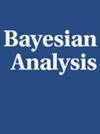一种高维贝叶斯变量选择的大都市自适应子空间算法
IF 2.5
2区 数学
Q1 MATHEMATICS, INTERDISCIPLINARY APPLICATIONS
引用次数: 0
摘要
提出了一种简单有效的自适应马尔可夫链蒙特卡罗(MCMC)方法,称为Metropolized adaptive Subspace(MAdaSub)算法,用于贝叶斯变量选择中高维后验模型分布的采样。MAdaSub算法基于独立的Metropolis Hastings采样器,在每次迭代后,使用贝叶斯自适应学习的形式更新解释变量的单个提议概率,使其最终收敛到各自协变量的后验包含概率。我们证明了该算法的遍历性,并提出了一个并行版本的MAdaSub,该算法具有基于多个链的信息组合的提议概率自适应方案。该算法的有效性通过各种模拟和真实数据示例得到了证明,包括一个具有20000多个协变量的高维问题。本文章由计算机程序翻译,如有差异,请以英文原文为准。
A Metropolized Adaptive Subspace Algorithm for High-Dimensional Bayesian Variable Selection
A simple and efficient adaptive Markov Chain Monte Carlo (MCMC) method, called the Metropolized Adaptive Subspace (MAdaSub) algorithm, is proposed for sampling from high-dimensional posterior model distributions in Bayesian variable selection. The MAdaSub algorithm is based on an independent Metropolis-Hastings sampler, where the individual proposal probabilities of the explanatory variables are updated after each iteration using a form of Bayesian adaptive learning, in a way that they finally converge to the respective covariates’ posterior inclusion probabilities. We prove the ergodicity of the algorithm and present a parallel version of MAdaSub with an adaptation scheme for the proposal probabilities based on the combination of information from multiple chains. The effectiveness of the algorithm is demonstrated via various simulated and real data examples, including a high-dimensional problem with more than 20,000 covariates.
求助全文
通过发布文献求助,成功后即可免费获取论文全文。
去求助
来源期刊

Bayesian Analysis
数学-数学跨学科应用
CiteScore
6.50
自引率
13.60%
发文量
59
审稿时长
>12 weeks
期刊介绍:
Bayesian Analysis is an electronic journal of the International Society for Bayesian Analysis. It seeks to publish a wide range of articles that demonstrate or discuss Bayesian methods in some theoretical or applied context. The journal welcomes submissions involving presentation of new computational and statistical methods; critical reviews and discussions of existing approaches; historical perspectives; description of important scientific or policy application areas; case studies; and methods for experimental design, data collection, data sharing, or data mining.
Evaluation of submissions is based on importance of content and effectiveness of communication. Discussion papers are typically chosen by the Editor in Chief, or suggested by an Editor, among the regular submissions. In addition, the Journal encourages individual authors to submit manuscripts for consideration as discussion papers.
 求助内容:
求助内容: 应助结果提醒方式:
应助结果提醒方式:


